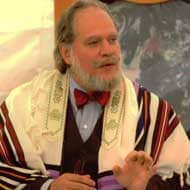And of course higher than that is total anonymity, when the donor and recipient are unknown to each other.
And the highest form of Tzedaka, the best form of giving, is not having to give, living in a world where it is no longer necessary. The highest form of Tzedaka is to help sustain individuals before they become impoverished by offering a substantial gift in a dignified manner, or by extending a suitable loan, or by helping them find employment, or by establishing them in business so as to make it unnecessary for them to become dependent on others.
The purpose of all of these discussions, suggestions, guidelines, and laws, the highest goal of Tzedaka is simply put in Parashat Re'eh where it says: "There shall be no needy among you ... if only you heed the HaShem, your God and take care to keep these instructions that I enjoin upon you this day." (Dvarim 5:4-5)
And yet there are times when someone goes above and beyond even the ladder of Maimonides. There are people who ascend into heaven and even higher.
There is a story of a rabbi who disappeared every year during the time of Slihot, the time when Jews are digging into their souls to prepare the way for Yom Kippur, the Day of Atonement. And while everyone was in the synagogue praying, fasting, turning their hearts to G, their rabbi was nowhere to be found.
His devout followers would say that at these times their rabbi had climbed to heaven to speak with G. Now it happens that a mitnaged, a person who is always disagreeing with what is obvious, came to town. When he heard that the rabbi was missing the so-very-important prayers of Slihot and further heard that his followers thought that he had ascended to heaven he was doubtful. He decided that he would have to see it to believe it.
He hid under the rabbi's bed (of all the Hutzpah) and when the rabbi woke up the next morning the mitnaged was awake waiting. He saw the old rabbi do his morning prayers after washing but instead of putting on his traditional Jewish garb he put on the clothes of a woodchopper. The mitnaged was shocked to watch the rabbi carrying his ax and some rope on this holy day. He hid and watched the rabbi chop wood into usable sizes and carry it into the town. He knocked on doors and called out: "Wood for sale!"
The mitnaged was gleefully shocked at the rabbi's behavior but he kept following. The rabbi would go in to house after house, sometimes coming out with a few coins payment but mostly without anything to show for his trouble. Sometimes the mitnaged saw the rabbi working, building fires for people even when they could not pay. He overheard the rabbi occasionally sharing little tiny bits of Torah learning (called Shtickele Torah).
Finally the rabbi came to a very poor house, the poorest in the town. He banged on the door and an old lady screeched: "Go away! I can't afford your wood!" But the rabbi entered all the same. The mitnaged stood outside and peered into the window. The rabbi busied himself over the protests of a very elderly and sick woman. He built a fire and stacked enough wood for a week. Then he reached into his bag and pulled out a chicken that he had brought from his own meager home. He began to cook for the old lady all the while chatting, telling her stories from Torah, whistling while he worked. Then, he poured the soup into a bowl and fed the old woman.
Finally, as she was fed and the small hovel was warm, she looked up at him and said: "I have nothing with which to pay you!" The rabbi laughed. "My dear excellent woman," he beamed, "I trust that in your own way you will repay me for the little that I have done. I have faith in you! Can you not have a little faith in the Holy One of Being, that G will support you in your time of trouble? Maybe G will not change what is in your life, but don't you think that even now G has given you the wisdom and compassion to face the hardships that come upon us in this world?" The woman wept and thanked the rabbi. He brushed away her tears and gave her a blessing and was gone.
The mitnaged is now a member of the rabbi's synagogue. He attends services and he donates to every cause that he can. And when other congregants comment during Slihot that their rabbi has ascended to heaven, if you listen carefully you will hear the mitnaged say: "If not higher!"
I came upon these reflections after I read a small newspaper article about a Mr. Robert I. Lappin, a man robbed by the evil Bernie Madoff (Y'S)1 (pronounced Made Off). Though he had lost 90% of his net worth, this man took his own money to replace the retirement savings of employees who lost their money to the swindler Bernie Madoff (Y'S). When asked about it, he simply said: "I wanted to do the right thing." If I were to translate that humble and powerful sentence into Hebrew I would use the word Tzedaka, which means, "the right thing to do!" It also means "being righteous." This year that rabbi, who ascends to heaven if not higher, has company, a businessman from North Shore by the name of Robert I. Lappin.





